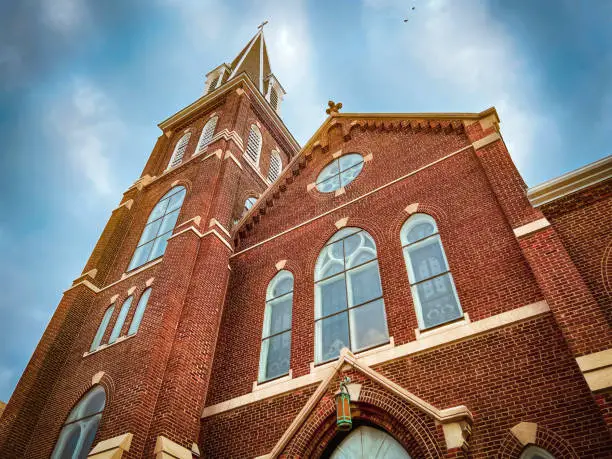As a church leader, you understand the importance of securing funds to continue your mission and expand your impact in the community. Building grants for churches is a powerful tool that can help fuel your ministry’s growth, outreach, and community projects. However, applying for grants can often feel overwhelming, especially when you’re uncertain where to begin or how to find the right funding opportunities.
But don’t worry, with the right guidance, the process can be smoother than you think. In this post, we’ll guide you through the essentials of building grants for churches, provide strategies for finding funding, and highlight key tips for crafting successful applications.
Understanding the Need for Building Grants in Churches
Churches are pillars in communities, providing spiritual guidance, support, and tangible services to those in need. But maintaining and expanding a church’s infrastructure or programs often requires more than just donations.
Building grants for churches can provide a steady influx of funds needed for significant investments like constructing new facilities, modernizing technology, or launching community outreach initiatives.
According to a study by the National Fundraising Association, over 60% of nonprofit leaders believe that grants are a critical component of their funding strategy. For churches, this is doubly important, as many small to medium congregations rely on grants to supplement tithes and donations for capital projects.
Why Are Grants a Smart Investment for Churches?
Grants offer “free money”—funds that do not require repayment, unlike loans. They allow churches to pursue ambitious projects without the heavy financial burden of debt. Grants can also serve as an endorsement of your church’s mission, lending credibility and opening doors to more opportunities and partnerships.
Key benefits of grants include:
- Financial Stability: Grants provide a reliable revenue stream, reducing dependence on unpredictable donations.
- Community Engagement: Many grants emphasize community impact, which aligns with the core mission of most churches.
- Capacity Building: Funds can be used not just for immediate projects but also to build long-term capabilities, such as staff training, technology upgrades, and sustainable practices.
A survey by the Grant Professionals Association indicates that nonprofits that incorporate grants in their fundraising strategy often experience a 30% increase in program outcomes, showcasing the transformative potential of securing funding.
Types of Grants Available for Churches
When searching for building grants for churches, it’s important to recognize that there are various types of grants out there, each with its own focus and eligibility criteria. Expanding on our initial overview, let’s dive deeper into the different categories:
1. Government Grants
Government grants at the federal, state, and local levels can be particularly beneficial for churches since they often target community improvement projects, educational programs, or social services. Some categories include:
- Community Development Block Grants (CDBG): Often provided by the Department of Housing and Urban Development (HUD), these grants can be used for community infrastructure projects. Churches might apply for CDBG if their project enhances community facilities or services.
- Educational and Youth Programs: Grants from the Department of Education or local school boards often support after-school programs, tutoring, or youth mentorship initiatives run by churches.
- Public Health and Safety: Churches involved in community health initiatives or safety training programs can look into grants offered by the Centers for Disease Control and Prevention (CDC) or local health departments.
2. Faith-Based Grants
Faith-based grants are specifically designed to support religious organizations like churches. These are typically offered by religious foundations, denominations, or philanthropic organizations that prioritize faith-based community work. For example:
- The Lilly Endowment: One of the largest private foundations dedicated to religion, education, and community development, often provides grants for theological education, pastoral leadership, and community engagement projects.
- The Mustard Seed Foundation: Focuses on projects that support vulnerable communities, often aligning well with church outreach programs.
These grants generally require demonstrating a clear alignment with the foundation’s mission, showcasing how the funds will further both the church’s mission and community betterment.
3. Private and Corporate Grants
Private foundations and corporations may not always focus exclusively on churches, but many support initiatives that churches can lead or partner with:
- Community Foundation Grants: Local community foundations often support capital improvements, community education, or social service programs run by churches.
- Corporate Social Responsibility (CSR) Programs: Corporations like Walmart, Target, or local businesses might offer grants that churches can leverage, especially if the project benefits the community through education, workforce development, or environmental sustainability.
It’s wise to research corporations or foundations that have a history of working with religious or nonprofit organizations in your area.
4. Emergency Funding Grants
When unexpected events like natural disasters or economic downturns strike, churches may face sudden financial challenges. Emergency funding grants can provide immediate relief to cover urgent repairs, support displaced members, or adapt to new community needs.
For instance, the United Methodist Committee on Relief (UMCOR) offers emergency grants for churches impacted by disasters. These grants often cover costs related to rebuilding, temporary shelters, or crucial service continuity.
5. Building or Capital Improvement Grants
Capital improvement grants help churches afford major repairs, renovations, and new construction projects. These grants can cover a wide range of needs, including:
- Structural Repairs: Addressing issues in aging buildings to meet safety codes and accessibility standards.
- Renovations: Modernizing facilities to support community programs, such as installing energy-efficient heating/cooling systems or expanding kitchen facilities for community meals.
- New Construction: Building additional spaces like community centers, classrooms, or dedicated youth halls.
Potential sources for these grants include local community development financial institutions (CDFIs), regional planning organizations, and specific capital improvement funds offered by foundations.
How to Locate and Identify the Right Grants for Your Church
Finding the right grant opportunities requires research, perseverance, and strategy. Here are several detailed approaches to locate grants relevant to your church’s needs:
1. Utilize Online Grant Databases
Online databases can streamline the search process significantly. By registering on these platforms, you gain access to a curated list of grant opportunities tailored to nonprofits and churches. Some reliable options include:
- GrantStation: Offers a subscription-based service where you can search for grants across categories, including those specific to churches.
- Candid (formerly Foundation Center): Provides comprehensive data on foundations, donor profiles, and past grant recipients.
- Grants.gov: The federal government’s primary portal for federal grants. It’s essential for finding government grants.
- Instrumentl: A newer platform that matches nonprofits with relevant grant opportunities based on your organization’s focus areas.
These platforms not only list opportunities but also often provide tools like application calendars, proposal writing guides, and budgeting templates to support your grant application process.
2. Local Government and Community Resources
Your local government offices, community foundations, and city council websites often list grants aimed at community development, education, safety, and other areas that align with church programs. Additionally, community resource centers or nonprofit support organizations often host workshops or training sessions on finding and applying for grants.
3. Network Within Religious and Community Circles
Networking remains a vital strategy. Engage with denominational networks, other churches, and nonprofit organizations to share insights and learn about funding opportunities. Sometimes, grant opportunities are discovered through word-of-mouth or collaborative partnerships. Denominational bodies often provide centralized grant opportunities or resources for local churches.
4. Attend Grant Writing Workshops and Webinars
Regularly attending workshops and webinars can improve your ability to find and apply for grants. Resources like the Grant Writing Academy offer trainings specifically designed for religious organizations, with experts who understand the unique challenges and opportunities churches face when applying for grants.
By attending these sessions, you learn insider tips, writing techniques, and networking skills that can significantly boost your success rate.
Crafting an Effective Grant Proposal: Step-by-Step
Now that you know where to find grants, let’s delve deeper into crafting a winning proposal. A high-quality grant proposal tells a compelling story, clearly outlines needs, solutions, and demonstrates your church’s capability to execute the project. Here’s a detailed blueprint:
1. Start with a Powerful Introduction
Your introduction should grab the funder’s attention immediately. Start with a powerful hook—a heartfelt anecdote, a striking statistic, or a brief story about how your church has positively impacted the community. This personal touch can resonate with reviewers and set the stage for a memorable proposal.
“In the heart of our community, a small group of dedicated volunteers transformed an old, abandoned building into a vibrant community center—a safe haven for youth, a source of education, and a meeting place for those seeking solace.”
This story not only conveys the transformative power of your church’s work but also underscores the tangible outcomes that a grant could support.
2. Clearly Define the Need
Explain the specific problem your church aims to address with the grant funds. Use data and statistics to back up your claims. For example, if you’re seeking funds to renovate your sanctuary, you might mention:
- The current state of the building (e.g., leaky roof, outdated facilities).
- The number of community members who use the church for services, education, or shelter.
- Local demographic data that highlights the growth of your congregation or the rising needs of the community.
According to the Pew Research Center, over 70% of Americans attend religious services regularly. This statistic underscores the central role of churches in communities, emphasizing the broader impact that improved facilities could have.
3. Outline Your Project Plan
Once you’ve established the need, detail your project plan. Break down the tasks, timeline, and key milestones. Use simple language and bullet points for readability:
- Phase 1: Planning and Design
- Conduct assessments of current facilities.
- Engage with community stakeholders for input.
- Phase 2: Construction/Renovation
- Hire qualified contractors.
- Procure sustainable materials.
- Oversee construction quality and safety.
- Phase 3: Program Implementation
- Set up new community classes.
- Launch outreach programs using the renovated space.
- Evaluate community feedback and impact.
This detailed plan shows funders that your church has a structured approach and the organizational capacity to manage the grant effectively.
4. Present a Comprehensive Budget
A detailed budget is essential. It should include all projected costs such as materials, labor, administrative overhead, and contingency funds. Use a table for clarity:
| Expense Category | Estimated Cost |
|---|---|
| Building Materials | $50,000 |
| Contractor Fees | $30,000 |
| Furniture and Equipment | $20,000 |
| Program Supplies | $5,000 |
| Contingency (10%) | $10,000 |
| Total | $115,000 |
Explain how each cost contributes to the overall project goals, and why these funds are necessary for success.
5. Demonstrate Sustainability and Impact
Funders want to see long-term benefits and sustainability. Explain:
- How your church will maintain the facility or program after grant funds are exhausted.
- Plans for future fundraising, community partnerships, and volunteer involvement.
- Long-term community impact—how will the project improve lives, create lasting relationships, or foster community growth?
Use real-life examples and testimonials from community members who have benefited from your church’s work. For instance, include a quote like:
“Thanks to our church’s youth program, I found a mentor during a difficult time in my life. The new community center will allow us to expand these programs and reach even more young people.” — [Name], Local Community Member
6. Review, Edit, and Get Feedback
Before submission, have multiple people review your proposal—board members, community stakeholders, and even a professional grant writer. Fresh eyes might catch errors or unclear sections. Consider using a checklist to ensure all grant guidelines are met and that your proposal is as strong as possible.
Avoiding Common Pitfalls and Mistakes
Even with a stellar proposal, there are common pitfalls to avoid:
- Ignoring the Grant’s Objectives: Each grant has its own set of goals. Tailor your application to highlight how your project aligns with these objectives.
- Using Jargon: While your church members might understand theological terms, grant reviewers may not. Keep the language simple, clear, and professional.
- Neglecting Supporting Documents: Always include required attachments such as your church’s budget reports, tax-exempt status letters, and letters of support from community partners.
- Overlooking Follow-Up: After submitting, send a thank-you note or email. If you don’t hear back within the stated time, politely follow up to inquire about the status of your application.
Data, Sources, and Useful Links
- National Fundraising Association: Research on nonprofit funding trends (source).
- Pew Research Center: Religious service statistics (source).
- Grant Professionals Association: Survey data on nonprofit funding strategies (source).
- Grants.gov: Database of federal grants (source).
- Candid: Foundation and grant information (source).
Embracing the Journey with Grant Writing Academy
Navigating the world of building grants for churches is an ongoing journey of learning, applying, and improving. It requires dedication, strategic planning, and an openness to learning from mistakes and successes alike. Every successful grant application brings not just funds but also experience and lessons that build your church’s capacity for future endeavors.
At Grant Writing Academy, we’re here to help you every step of the way. Our platform offers:
- Tips and Strategies: Learn how to research grants, craft compelling narratives, and create sustainable project plans.
- Templates and Tools: Use customizable proposal templates, budgeting spreadsheets, and timeline planners to streamline your process.
- Expert Advice: Gain insights from seasoned grant writers who understand the unique challenges churches face.
By subscribing to the Grant Writing Academy Newsletter, you’ll have direct access to these resources. Imagine having a toolkit designed to enhance your success rates, with advice tailored specifically for church grant writing.
You’ll receive regular updates, curated lists of grant opportunities, insider strategies, and success stories from other churches who’ve walked this path.
Ready to transform your church’s future through successful grant applications? Subscribe now to the Grant Writing Academy Newsletter and embark on the journey toward securing the funding your church needs to thrive.
Conclusion
Building grants for churches is not merely about securing funds; it’s about advancing a mission, strengthening community ties, and fostering sustainable growth.
By understanding the types of grants available, where to find them, and how to craft persuasive proposals, your church can navigate the funding landscape with confidence. Remember that every grant application is a chance to refine your strategies, build relationships with funders, and ultimately serve your community better.
Take the first step today—empower your church with the knowledge, tools, and support needed to succeed. Subscribe to the Grant Writing Academy Newsletter for continuous guidance and start transforming your ideas into funded realities. With persistence, strategic planning, and the right resources, your church can secure the grants necessary to make a lasting impact.
Additional Resources and Support
a) Expand Your Knowledge
The grant writing field is always evolving. Keep learning and improving your skills to stay competitive.
Recommended Resources:
- Request for Proposal Success: How to Write Proposals That Win: Learn the techniques and strategies to create standout proposals.
- Tech Startup Funding Secrets: Navigating Grants for Maximum Growth: Perfect for those in the tech sector looking to leverage grants for scaling.
- Grant Proposal Guide for Environmental Projects: Tailored for environmental initiatives seeking to secure impactful funding.
- The Ultimate Guide to Federal Grant Applications: Techniques for Success: Master the complexities of federal grants with actionable insights.
Explore More Books Here
b) Invest in Expert Guidance
Want to fast-track your growth and achieve even more success?
Join one of our mentorship programs for tailored advice and support:
Mentorship Programs:
- 3-Month Mentorship: The Foundation Builder: A short-term plan to refine your grant writing skills and win your first (or next) grant.
- 6-Month Mentorship: The Proposal Pro: Dive deeper into strategies, proposal reviews, and funding plans.
- 1-Year Mentorship: The Funding Champion: Build long-term success with comprehensive guidance, unlimited reviews, and exclusive resources.
C) Book a One-on-One Consultation
Sometimes you just need personalized advice to tackle challenges or fine-tune your strategy. Let’s work together to solve your unique grant writing challenges.




